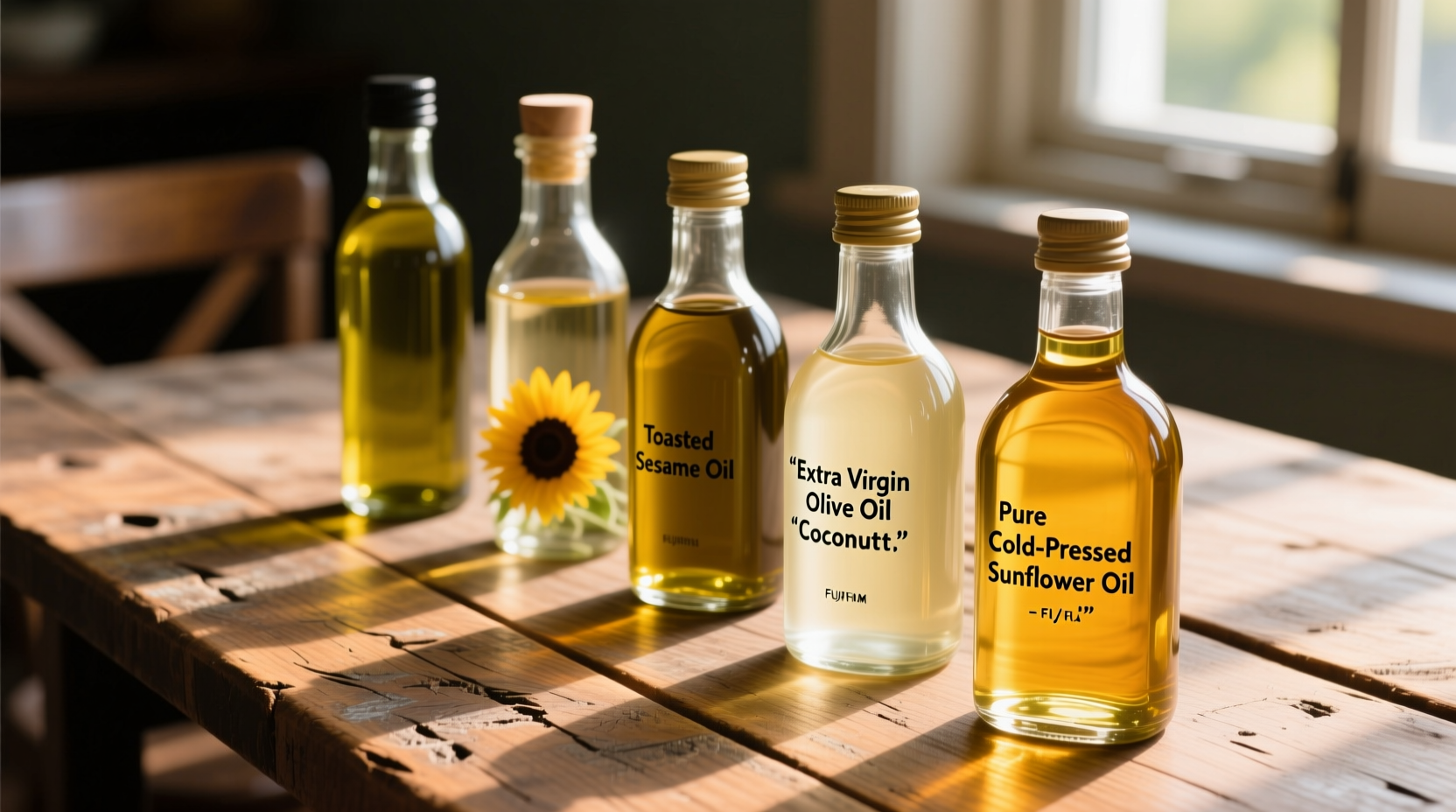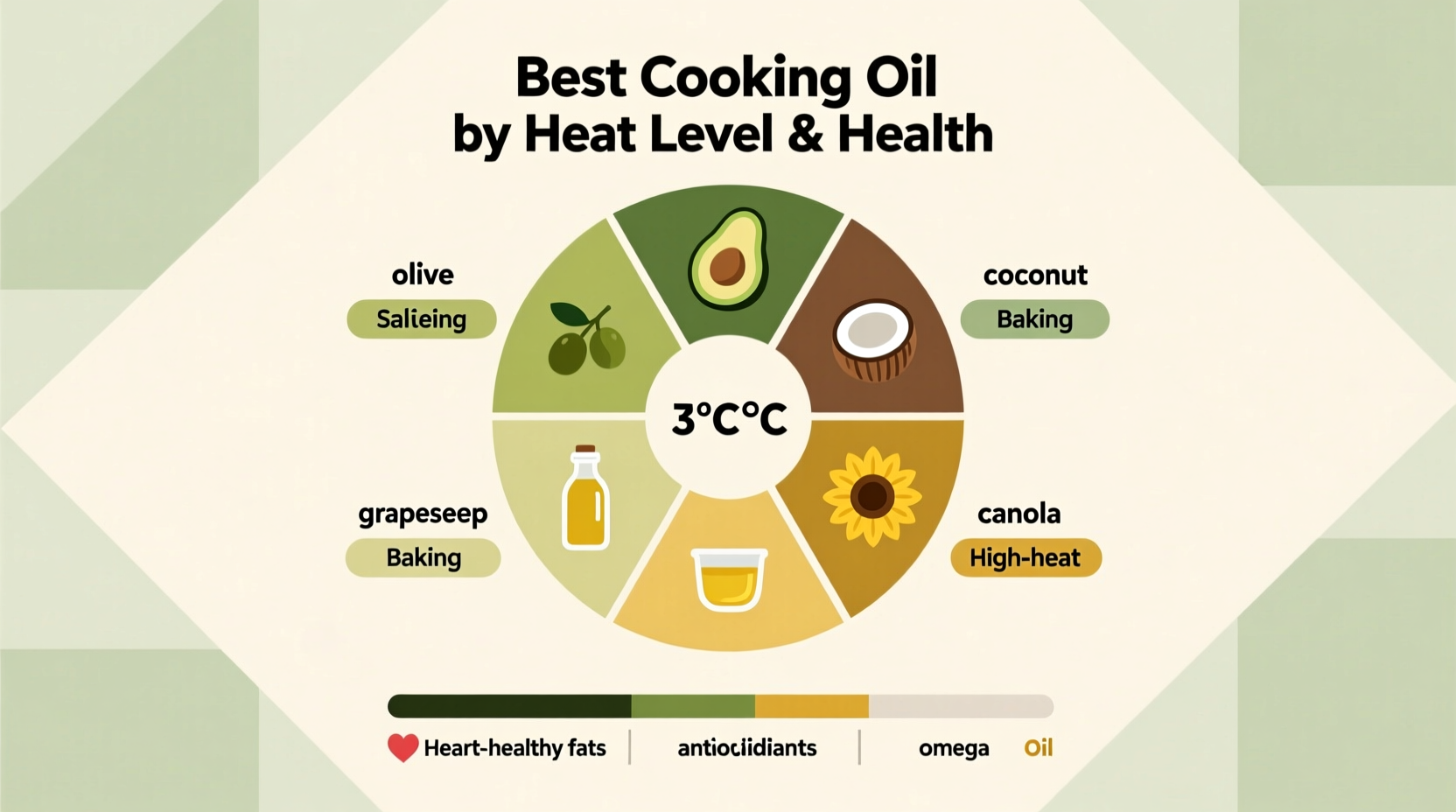When you stand in the grocery aisle staring at dozens of cooking oil options, it's easy to feel overwhelmed. You've probably heard conflicting advice: olive oil is heart-healthy but can't handle high heat; coconut oil is trendy but high in saturated fat; avocado oil is expensive but versatile. The truth is more nuanced than any single headline suggests.
Why There's No Universal "Best" Cooking Oil
Choosing the right oil isn't about finding one perfect option for everything—it's about matching the oil's properties to your specific culinary needs. Different oils excel in different scenarios based on three critical factors:
- Smoke point—the temperature at which oil begins to break down and produce smoke
- Fatty acid composition—how the oil affects your health when consumed
- Flavor profile—how the oil complements or competes with your dish
Using the wrong oil for high-heat cooking can create harmful compounds, while choosing an oil with an overpowering flavor might ruin a delicate dish. Let's break down what matters most when selecting your cooking oil.
Understanding Cooking Oil Fundamentals
Before comparing specific oils, it's essential to understand the science behind what makes an oil suitable for different cooking methods.
Smoke Point: Your Oil's Temperature Threshold
The smoke point represents the maximum temperature an oil can reach before it starts to break down, producing smoke and potentially harmful compounds like acrolein. When oil smokes, it not only affects flavor but can generate free radicals and other potentially harmful substances.
Several factors influence an oil's smoke point:
- Natural impurities and free fatty acids
- Processing method (refined oils generally have higher smoke points)
- Freshness (older oils have lower smoke points)
Fatty Acid Composition: Health Implications
All cooking oils contain a mix of three types of fats:
- Saturated fats—solid at room temperature, more stable at high heat
- Monounsaturated fats—liquid at room temperature, relatively stable
- Polyunsaturated fats—liquid at room temperature, less stable when heated
The American Heart Association recommends replacing saturated fats with unsaturated fats where possible for heart health, but stability during cooking matters too. Oils high in polyunsaturated fats (like standard vegetable oil) can oxidize more readily when heated, potentially creating harmful compounds.
| Cooking Oil Type | Smoke Point (°F) | Primary Fat Composition | Best Cooking Methods |
|---|---|---|---|
| Refined avocado oil | 520°F | Monounsaturated (70%) | Deep frying, searing, grilling |
| Refined safflower oil | 510°F | Polyunsaturated (75%) | Deep frying, high-heat cooking |
| Refined peanut oil | 450°F | Monounsaturated (48%) | Stir-frying, deep frying |
| Light/refined olive oil | 465°F | Monounsaturated (75%) | Sautéing, baking |
| Extra virgin olive oil | 320-375°F | Monounsaturated (73%) | Salad dressings, low-heat cooking |
| Coconut oil (refined) | 450°F | Saturated (90%) | Baking, medium-heat cooking |
| Butter | 300°F | Saturated (63%) | Finishing, low-heat sautéing |
Health Considerations: Beyond the Hype
With so many conflicting health claims about cooking oils, it's essential to look at evidence-based recommendations from authoritative sources. The Dietary Guidelines for Americans 2020-2025, developed by the U.S. Departments of Agriculture and Health and Human Services, recommends replacing saturated fats with unsaturated fats to reduce cardiovascular disease risk.
According to research published in the Journal of the American College of Cardiology, replacing just 5% of daily calories from saturated fats with polyunsaturated or monounsaturated fats can reduce coronary heart disease risk by 25% and 15% respectively. However, the stability of these fats during cooking matters—polyunsaturated fats are more prone to oxidation when heated.
When evaluating health claims, consider these evidence-based perspectives:
- Olive oil—Extensively studied in Mediterranean diet research, associated with reduced cardiovascular disease risk. The PREDIMED study (published in New England Journal of Medicine) found extra virgin olive oil supplementation reduced major cardiovascular events by 30%.
- Coconut oil—Higher in saturated fat than butter, with mixed evidence on health effects. The American Heart Association cautions against coconut oil due to its high saturated fat content, though some newer research suggests medium-chain triglycerides (MCTs) in coconut oil may have different metabolic effects.
- Avocado oil—Similar fatty acid profile to olive oil with higher smoke point, making it versatile for both health and cooking performance.

Practical Guide: Choosing the Right Oil for Your Needs
Instead of searching for one "best" oil, build a small collection suited to different cooking tasks. Here's how to match oils to specific applications:
For High-Heat Cooking (400°F and above)
When searing steaks, deep frying, or cooking at very high temperatures, choose oils with smoke points above 400°F:
- Refined avocado oil—Neutral flavor, high smoke point, heart-healthy monounsaturated fats
- Refined safflower or sunflower oil—Economical option for deep frying
- Refined peanut oil—Excellent for Asian stir-fries and deep frying
According to the USDA Food Safety and Inspection Service, maintaining oil temperature between 350-375°F is optimal for deep frying—too low causes greasy food, too high creates harmful compounds. A thermometer is essential for precision.
For Medium-Heat Cooking (300-400°F)
For sautéing, baking, and most everyday cooking:
- Light/refined olive oil—Higher smoke point than extra virgin with milder flavor
- Grapeseed oil—Neutral flavor, good smoke point (390°F)
- Canola oil—Economical, neutral flavor, but choose non-GMO or organic if concerned about sourcing
For Low-Heat Cooking and Raw Applications
For salad dressings, dips, and finishing dishes:
- Extra virgin olive oil—Rich flavor and maximum health benefits when unheated
- Unrefined coconut oil—Adds distinct flavor to certain dishes
- Walnut or sesame oil—Use sparingly for flavor accents
Storage and Shelf Life: Preserving Oil Quality
Proper storage significantly impacts oil quality and safety. Most cooking oils are vulnerable to three degradation factors:
- Light—Store oils in dark glass or opaque containers
- Heat—Keep in a cool, dark pantry away from the stove
- Air exposure—Tightly seal containers after each use
According to the National Center for Home Food Preservation, most oils remain fresh for 6-12 months when stored properly. Oils high in polyunsaturated fats (like walnut or flaxseed) spoil fastest and should be refrigerated. Rancid oil develops an unpleasant smell and taste and may contain harmful compounds—when in doubt, discard it.
Making Your Decision: A Practical Framework
Next time you're choosing a cooking oil, follow this simple decision tree:
- What's the cooking temperature? Match the oil's smoke point to your method
- What flavor profile do I want? Neutral or distinctive?
- What are my health priorities? Balance heart health with cooking performance
- What's my budget? Specialty oils cost more but may be worth it for specific uses
For most home kitchens, having three oils covers 95% of cooking needs:
- A high-heat oil (avocado or refined peanut)
- A medium-heat oil (light olive or canola)
- A finishing oil (extra virgin olive)
Remember that cooking technique matters as much as oil selection. Proper temperature control, avoiding reusing oil multiple times, and not overheating your oil are equally important for healthy cooking.
Frequently Asked Questions
Can I use extra virgin olive oil for frying?
Yes, but with limitations. Extra virgin olive oil has a smoke point between 320-375°F, making it suitable for light frying or sautéing but not ideal for deep frying. For high-temperature frying, use refined olive oil which has a higher smoke point (around 465°F) while maintaining similar health benefits.
Is coconut oil healthier than olive oil?
Most evidence suggests olive oil is healthier. Coconut oil is 90% saturated fat compared to olive oil's 14%, and the American Heart Association recommends limiting saturated fats. While coconut oil contains medium-chain triglycerides (MCTs) that may have different metabolic effects, the majority of research supports olive oil's cardiovascular benefits.
How can I tell if my cooking oil has gone bad?
Rancid oil develops a stale, paint-like smell and sometimes a slightly sour or bitter taste. If your oil smells or tastes "off," discard it immediately. Oils high in polyunsaturated fats (like walnut or flaxseed) spoil fastest and should be refrigerated. Most cooking oils remain fresh for 6-12 months when stored properly in a cool, dark place.
What's the healthiest oil for high-heat cooking?
Refined avocado oil is generally considered the healthiest option for high-heat cooking. It has a high smoke point (520°F), is rich in heart-healthy monounsaturated fats (70%), and remains stable when heated. Refined olive oil (smoke point 465°F) is another excellent option that offers similar health benefits with a more neutral flavor profile than extra virgin olive oil.











 浙公网安备
33010002000092号
浙公网安备
33010002000092号 浙B2-20120091-4
浙B2-20120091-4